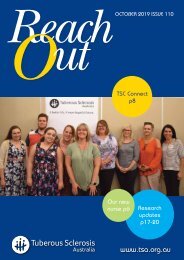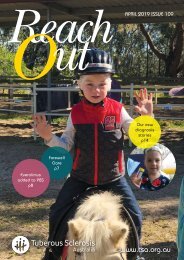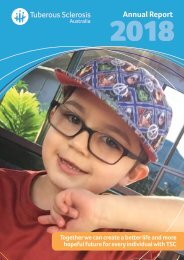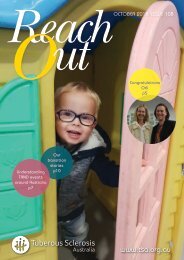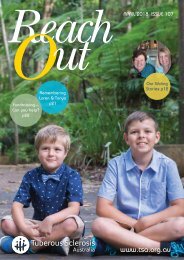Reach Out, April 2016, isue 103
The latest news from Tuberous Sclerosis Australia and up to date information on tuberous sclerosis information, support and research.
The latest news from Tuberous Sclerosis Australia and up to date information on tuberous sclerosis information, support and research.
Create successful ePaper yourself
Turn your PDF publications into a flip-book with our unique Google optimized e-Paper software.
Personal Stories<br />
Insurance Adventure<br />
Things to think about when choosing service providers<br />
• Think carefully about what it is you want for your child.<br />
Don’t be afraid to dream big – where do you want your child<br />
to be in 5 years’ time? In a job? Then look at accessing job<br />
training services. Living out of home? Residential services.<br />
You’d be surprised how many programs and services NDIS<br />
will cover.<br />
• The NDIS is person-centred. The aim is to put in place the<br />
supports needed to help your child be the person they are<br />
or want to become. You may already be accessing some<br />
disability services – are these of maximum benefit to your<br />
child? The NDIS will fund support that allows your child<br />
to ‘achieve the same outcomes as their previous support,’<br />
although it may not be with the same provider currently<br />
used. This is a great opportunity to think about your child’s<br />
personhood, their interests and likes, their strengths and<br />
weaknesses, their personality. At planning stage, a lot of<br />
questions will be directed at getting to the core of who your<br />
child is, family and friends may be asked to participate. It’s<br />
worth having a round table with all the family to discuss<br />
goals, interests and aspirations. The role of service providers<br />
should be to facilitate growth, to create opportunities and<br />
experiences to develop their client.<br />
• What do you currently do for your child? Note down all the<br />
things you currently do for him or her every day. This is<br />
the level of support they will need in their funding package<br />
for a service provider to do it for them. I know it’s tempting<br />
to ‘talk your child up’ and be proud that they can tie their<br />
shoes, or do up the zip on their jacket. But take into account<br />
the bad days, when they won’t cooperate, won’t wear their<br />
jacket, or take their shoes off and throw them. Use this as<br />
your baseline for the level of support they’ll need. These bad<br />
days may only happened once or twice a month, but you’ll<br />
have peace of mind knowing the funding is there should it be<br />
needed. If your child currently receives mobility allowance<br />
from Centrelink, factor in any transport needs, as they will<br />
cease to receive mobility allowance under NDIS.<br />
• The NDIS website has a list of registered providers in your<br />
area. It also has a list of prices, but this is not important at<br />
the initial stage. Choose the services you believe your child<br />
needs and be prepared with detailed reasons why they need<br />
them. Some services will require backup documents from<br />
therapists involved with your child. For example, in order<br />
to receive funding for Liam’s exercise physiology program<br />
at the pool we needed a letter of endorsement from his occupational<br />
therapist.<br />
• As the NDIS aims to support the whole person, there are<br />
a large range of wellbeing options, ranging from physiotherapy<br />
to nutrition, exercise programs and swimming. Be<br />
well informed at the start and if you’re not sure if a service is<br />
funded, phone or email and ask!<br />
Time to chat: Once you’ve made some decisions around which<br />
services are needed, it’s time to call or meet with them. First visit<br />
the Department of Social Services website (www.dss.gov.au) and<br />
read the National Standards for Disability Services. These will<br />
give you a good idea of what a service provider should be, well…<br />
providing.<br />
Questions to ask providers<br />
• What is their vision for an individual? Do they have a mission<br />
statement? Ask for a copy. Ask them how they implement<br />
their vision day to day.<br />
• Ask how they see their role as a service provider. Do they really<br />
understand ‘person-centred’ or are they more focussed on<br />
a rigid outline of what they do as an organisation. They may<br />
not be prepared to be flexible, to be committed to your child’s<br />
growth journey, they may miss opportunities to develop and<br />
stretch her or him. Remember, the switch to a person-centred<br />
orientation is new to service providers as well.<br />
• Are the staff trained in alternative forms of communication<br />
(if your child has challenges in this area). If so, ask them to<br />
demonstrate for you.<br />
• All the services I have ever dealt with welcome visits. Make<br />
sure you also pop in unannounced from time to time. Observe<br />
the dynamic, watch how staff interact with individuals<br />
there. Check the surroundings. Come back at different times<br />
of day – the environment might be very different at 3pm, say,<br />
when perhaps groups of people are coming back from outings<br />
creating a noise level that may be too much for your child.<br />
Overwhelmed? Get yourself a Coordinator of Supports. Liam<br />
has funding for around 6 hours a week for this service, and we<br />
went with an organisation who had been advocating for us for<br />
years and we had a good relationship with. Our Coordinator of<br />
Supports is an absolute godsend. She’s up<br />
to date with who is offering what, can<br />
arrange everything easily, even down<br />
to simply ordering continence aids. She<br />
can short-cut the process of deciding<br />
on appropriate providers because she<br />
knows what they all offer, where their<br />
facilities are, if they are near any shops<br />
that sell Coke! She also keeps me on<br />
track with regular meetings to discuss<br />
long and short term goals, where<br />
we’re going next with Liam and how<br />
we’re going to get there. We had<br />
been trying to navigate the system<br />
ourselves prior to 2015 and one of<br />
the results was that we had funding<br />
lines in Liam’s package we didn’t<br />
even realise were there. Which<br />
brings me to my next point.<br />
15


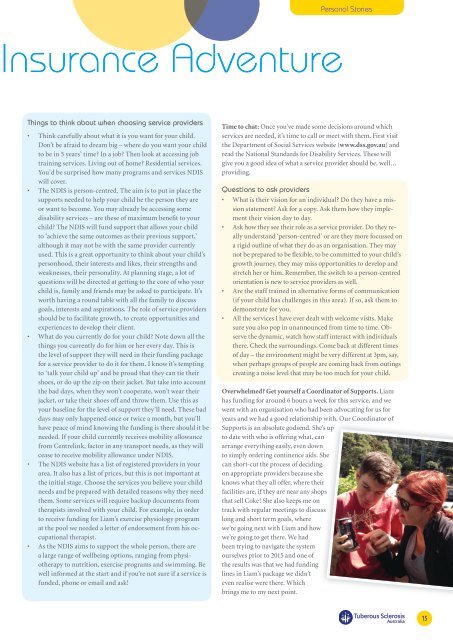


![TSA Reach Out April 2022 [Final]](https://documents.yumpu.com/000/066/687/587/3d369bd665bdb406a759500f62e2cfad0ccb7b3d/47512b4a703265727550565249426664566a727454513d3d/396a524e7354316d3867454b587243526164724c52673d3d.jpg?AWSAccessKeyId=AKIAICNEWSPSEKTJ5M3Q&Expires=1714719600&Signature=qJHW0wGclB0sNlxJbaupp76J6uY%3D)
![TSA AR 2021 [WEB] (1)_FINAL](https://documents.yumpu.com/000/065/886/431/1afb21934ac6c444cd384e5fd7403d62e47080ce/426853747566526573646568546777594b4a4a5734513d3d/547274595943503850786275754544495972536c52513d3d.jpg?AWSAccessKeyId=AKIAICNEWSPSEKTJ5M3Q&Expires=1714719600&Signature=hEYKyLS8ucVTl%2FkDJZpN0rnk23k%3D)

![TSA Reach Out Apr 2021 [WEB]](https://documents.yumpu.com/000/065/442/909/1e583cb2acba0eaa7f1aae53e14a0cf408aa56c4/7871796d694459464d707163324830746459484671673d3d/45356637637a3369494f764f4c3858495549795251513d3d.jpg?AWSAccessKeyId=AKIAICNEWSPSEKTJ5M3Q&Expires=1714719600&Signature=hKpfxRgD0QeCTFkfpGSQENiu5sY%3D)




